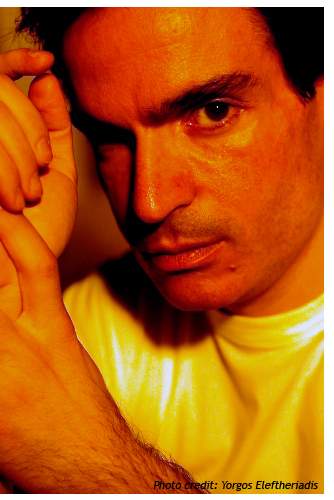 Christos Stassinopoulos is a Greek tenor opera singer and actor with a distinguished career in theatre, television, radio, and film. The Walt Disney Company selected him as the voice of Aladdin in the Greek dubbed version of the animated movie and its sequels and as the dubbed voices for Tweedledum and Tweedledee in Alice in Wonderland. He is also the Greek voice of Aladdin in the television series.
Christos Stassinopoulos is a Greek tenor opera singer and actor with a distinguished career in theatre, television, radio, and film. The Walt Disney Company selected him as the voice of Aladdin in the Greek dubbed version of the animated movie and its sequels and as the dubbed voices for Tweedledum and Tweedledee in Alice in Wonderland. He is also the Greek voice of Aladdin in the television series.
Selections from his latest work, Four Centuries of Songs, (which unfortunately is not available for distribution at the moment) can be heard on his website, MySpace page, and YouTube channel. The songs were selected from a number of cultural epochs from the Renaissance until today and are stunning examples of an astonishing natural gift honed by an artistic sensibility that is at once earthy and refined. Recently Christos took the time to talk with Wanda Waterman St. Louis about moving musical experiences and singing as an expression of his inner world.
Sweet Trouble
I grew up in Athens, Greece. I had a happy childhood, with loving, caring parents. My mother said I started singing just after I’d started talking. I was a ?sweet trouble? for them with all that premature passion for music and theatre. Naturally they were not positive when in my very early childhood I first expressed my desire to become a singer and an actor. I was allowed to practice acting and singing only as hobbies during my school years.
Being always an excellent pupil, they were expecting me to join a faculty, which I probably would have done as I was very interested in ancient Greek language, literature, and archaeology. But when I was only 14 years old I passed an audition before a Special Committee of the Ministry of Culture and was granted permission to enter a Drama School as an ?exceptionally talented? student without having yet finished high school.
 This happened in great secrecy from my parents. They discovered it quite soon and I was forced to leave the Drama School until I was 18, when I returned and concluded my studies.
This happened in great secrecy from my parents. They discovered it quite soon and I was forced to leave the Drama School until I was 18, when I returned and concluded my studies.
Expressing an Inner World
Singing hasn’t changed me; it has rather completed me. It’s never been a tool for winning recognition through a career but rather reflects my implicit need, my absolute way of expressing my inner world. But my music studies have taught me how important discipline and total devotion are for anyone who decides to enter this field; by means of them I became a ?soldier.?
My only official recording is The Nightingale of the Emperor, an opera for children by Lena Platonos, based on H. C. Andersen’s fairy tale (LYRA Records).
Mesmerizing Musical Experiences
It was a moving experience when I attended a recital by the legendary German mezzo-soprano Christa Ludwig at the Roman Odeon of Herod Atticus underneath the Acropolis, where she magnificently performed Winterreise by Franz Schubert, and also when I attended a concert by Dietrich Fischer-Dieskau in Konserthuset in Stockholm, where he performed Gustav Mahler’s Kindertotenlieder with the Royal Stockholm Philharmonic Orchestra.
I’ve been deeply moved whenever I’ve attended my beloved friend Markella Hatziano‘s numerous operatic performances and concerts here in Athens, especially when I had the chance to see her performing in Berlin (as Amneris in Verdi’s Aida in Staatsoper Unter den Linden under Zubin Mehta) and London (as Didon in Berlioz’s Les Troyens at the Barbican with the London Symphony Orchestra under Sir Colin Davis). It’s an indescribable feeling to be part of a very enthusiastic audience in a foreign country and to watch someone you love being glorified on stage. It’s even stronger than being on stage yourself.
Four Centuries of Songs
Four Centuries of Songs is a ?living? project, meaning that it has been the hub of my individual concerts in recent years. The idea is to combine under the same umbrella a selection of the different sorts of classical and non-classical songs I truly love to sing. Together with my permanent collaborator, the pianist Maria Neofytidou, we’ve been presenting a variety of music tesseras belonging to a spell of four centuries, from the Renaissance up to our times, forming a multicoloured mosaic that might attract an audience consisting of either initiates or accidental listeners with no special knowledge or liking of such music.
My favourite songs are any songs speaking to my heart and appealing to my aesthetics. It might be an Elizabethan lute song, a baroque madrigal, an oratorio aria, an aria antica, a lied by Schubert or Schumann, a Neapolitan canzonetta, a song by Gershwin, Bernstein, Lloyd Webber, Jerome Kern, or Sergio Endrigo, or a musical pearl by my favourite contemporary Greek composer Manos Hadjidakis.
Continued next week . . .

